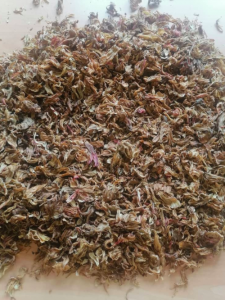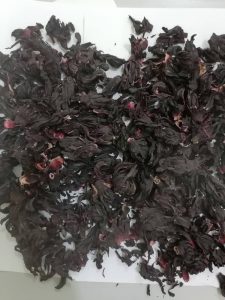Hibiscus, also known as Roselle (Hibiscus Sabdariffa), is a valuable and versatile crop whose brightly colored, star shaped flowers are made and used into a long list of byproducts. At Loquat Classic, we have 4 distinct types of Hibiscus; which are each in turn processed into different types of products.
Bright Red Hibiscus Flower

White Hibiscus Flower

Super Dark Hibiscus Flower

At Loquat classic as we process Hibiscus, 3 different products are extracted to fulfil the diverse needs of the market.
This is the first process that the product goes through. In this process the product goes through an extensive selection process in which the flower is carefully hand-picked to meet specific requirement of size, and shape, and color.
This is the second process that the product goes through. This is usually the byproduct of the Flower selection process. All the larger pieces that remain are extracted.
This is the third process that the product goes through. It is usually in a semi powder form and goes through an extensive cleaning process in which the powder is sieved and all impurities and dirt particles are removed.
Packaging can be done in PP bags or cartons.
Regular Hibiscus:
The Nigerian hibiscus is tangy and colorful with mid-level acidity. It is mostly sourced from six states in northern Nigeria. It has the unique combination of rich vibrant color and thirst-quenching astringency preferred by consumers and sought out by leading importers and packers.
Uses:
Hibiscus extract has numerous uses in the food and cosmetics industries. It can be used as an infusion added to fruit juice, as an ingredient in herbal teas, or used in jams and jellies. It is also used as a natural food coloring due to its vibrant color. It can also be used as a natural dye and is added to boost and promote hair and skin health in natural cosmetics brands.
Some Benefits of Hibiscus Flower are:
Copyright 2020 @ Loquat. All rights reserved.
